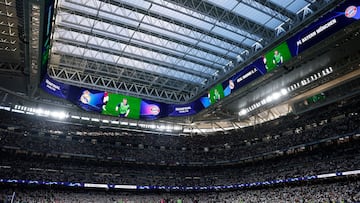Why have Real Madrid closed the roof at the Bernabéu stadium against Bayern in Champions League?
Already confirmed as LaLiga champions, Los Blancos are now putting their retractable roof to good use in the capital for a final push.

As the Champions League semifinal second leg neared kick-off, a big decision to close the roof of the Estadio Santiago Bernabéu had already been taken. Real Madrid had already shown off their new retractable roof option in another couple of huge games recently – when they played out a stunning 3-3 draw in the Champions League quarter final first leg against Manchester City followed by the first ever Clásico under a closed roof. Next up it was Bayern Munich.
But some observers were puzzled. The temperatures have been rising in the Spanish capital, and the beautiful, glorious sunny days with clear blue skies were with us. So why have Madrid decided to seal their stadium?
Bernabéu: containing and amplifying the noise
Madrid have tried out their retractable roof on a number of occasions this season - in the league games against Atlético, Villarreal and Getafe, as well as the UCL and Clásico clashes. Firstly, to ensure that the mechanical system is in good working order and secondly, as a means of trapping the noise within all four walls and creating a more vibrant, louder atmosphere.
While there is no denying that it is an imposing stadium to play at, in terms of actual match atmosphere, the Bernabéu has always struggled to get the whole crowd rocking. Yes, it gets loud - especially after the club turned the Fondo Sur into a Grada de Animación in 2013, but nowhere near as boisterous as San Mamés, the Metropolitano or even the old Calderón. It’s improved, but sometimes, the atmosphere can be a little flat.

By closing the roof, the noise generated inside the stadium by the 80,000 home fans (new stadium, new capacity) will be amplified - lifting the home team and creating an intimidating ambiance for the visitors.
Roof opening rules: LaLiga vs UEFA
While Real Madrid are allowed to wind their roof back and forth as much as they want and whenever they like in the league, in European competition, the matchday rules are much stricter. The club first must be granted permission in writing from UEFA as most matchday organization, logistics and procedures are handled, or overseen, by the competition organizer’s own match delegate and their team of officials. The first time Madrid played under cover in the Champions League was in the last round against RB Leipzig.
In LaLiga and for domestic Cup games, the decision to open or close the roof is left with the club although they stress that games must start and end in the same conditions - ie. if the game kicks off with the roof closed, it must remain closed until the final whistle.
El Clasico will be played tonight with closed roof ⚪️
— LiveScore (@livescore) April 21, 2024
It's gonna get 𝗟𝗢𝗨𝗗 at the Bernabeu 🔊 pic.twitter.com/yVMXHV4YoM
UEFA says closed roofs must stay closed
Related stories
UEFA’s competition regulations state in Article 32. 01-02: “Before the match, the UEFA match delegate, in consultation with the referee, decides whether a stadium’s retractable roof will be open or closed during the match. This decision must be announced at the match organisational meeting, although it may subsequently be altered at any time prior to kick-off if the weather changes, again in consultation with the referee.
“If the match starts with the roof closed, it must remain closed until half-time or for the entire match. If the match starts with the roof open, only the referee has the authority to order its closure during the match, subject to any applicable laws issued by a competent state authority. Such a decision may only be taken if the weather seriously deteriorates. If the referee does order the roof to be closed during the match, it must remain closed until half-time or the final whistle”.
Complete your personal details to comment